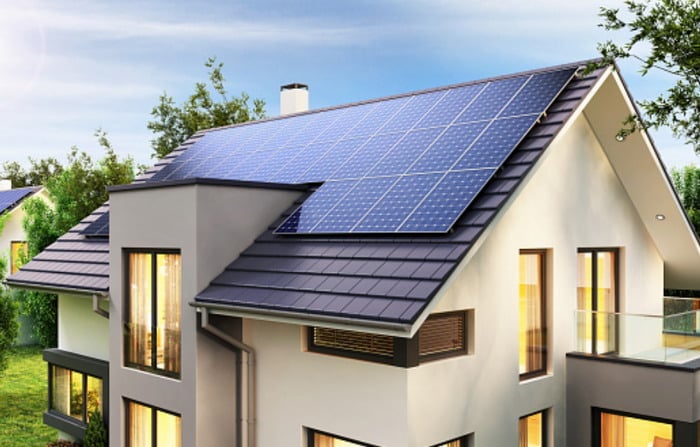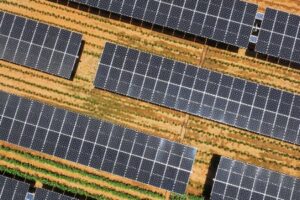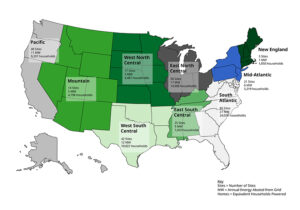Solar Panels For Home

Solar panels are an increasingly popular option for homeowners who want to reduce their energy bills and contribute to a more sustainable future. Solar panels work by converting sunlight into electricity, which can then be used to power homes and other buildings. In this article, we will explore the benefits of solar panels for home and provide an overview of what you need to know before installing them.
Benefits of Solar Panels for Home
Once you install a solar PV system on your roof or in the yard, you will save both the environment and your pocket.
1. Reduced Energy Bills
One of the most significant benefits of solar panels for home is the potential for significant savings on energy bills. By generating their own electricity, homeowners can reduce their dependence on the grid and avoid rising energy costs. While the upfront cost of installing solar panels can be significant, the long-term savings can more than make up for it, with many homeowners reporting savings of thousands of dollars over the lifetime of their solar panels.
2. Increased Home Value
In addition to reducing energy bills, solar panels can also increase the value of a home. According to a study by the Lawrence Berkeley National Laboratory, homes with solar panels sold for an average of $15,000 more than homes without solar panels. This is because solar panels are seen as a valuable asset that can help reduce energy costs for potential buyers.
3. Environmental Benefits
Solar panels generate clean, renewable energy that does not produce greenhouse gas emissions or contribute to climate change. By switching to solar energy, homeowners can significantly reduce their carbon footprint and do their part to protect the environment. In fact, according to the US Department of Energy, a typical residential solar panel system can offset the carbon emissions of a car driving 12,000 miles per year.
4. Government Incentives
Many governments offer incentives for homeowners who install solar panels, such as tax credits, rebates, and grants. These incentives can significantly reduce the cost of installing solar panels and make them a more affordable option for homeowners. In addition, some states and municipalities have net metering policies, which allow homeowners to sell excess electricity generated by their solar panels back to the grid.
5 .Energy Independence
By generating their own electricity, homeowners can achieve energy independence and reduce their vulnerability to power outages and fluctuations in energy prices. This can provide peace of mind and financial security, particularly in areas where power outages are common or energy prices are volatile.
6. Low Maintenance
Solar panels require very little maintenance, particularly if they are installed by a professional. Most solar panel systems come with a warranty that covers any defects or malfunctions, and regular cleaning and inspection can help ensure that they are functioning properly.
What You Need to Know Before Installing Solar Panels
Installing solar panels can be a great investment for your home and for the environment. However, it’s important to be informed and prepared before making the decision to install solar panels. Here are some key things you should know before installing solar panels:
1. Your Home’s Energy Needs
Before you install solar panels, it’s important to understand your home’s energy needs. This includes factors such as the size of your home, the number of people living in your home, and your typical energy usage. This information will help you determine the size and number of solar panels you need to meet your energy needs.

Solar panels for your roof, image source: Pixabay
2. Your Home’s Sun Exposure
The amount of energy your solar panels can generate depends on the amount of sunlight they receive. Before you install solar panels, it’s important to assess your home’s sun exposure. Factors such as the direction your roof faces, the pitch of your roof, and the amount of shading from nearby trees or buildings can all impact your solar panel’s energy output.
3. Your Roof’s Condition
Before you install solar panels, you’ll need to ensure that your roof is in good condition and can support the weight of the solar panels. It’s also important to consider the age of your roof and whether it will need to be replaced in the near future. If your roof needs repairs or replacement, it’s best to take care of this before installing solar panels.
4. The Cost of Installation
The cost of installing solar panels can vary depending on factors such as the size of the system, the quality of the equipment, and the complexity of the installation. It’s important to get quotes from several reputable solar installation companies to compare costs and ensure that you’re getting a fair price.
5. Government Incentives
Many governments offer incentives for homeowners who install solar panels, such as tax credits, rebates, and grants. It’s important to research the incentives available in your area and factor them into your decision to install solar panels.
6. Maintenance Requirements
While solar panels require very little maintenance, it’s important to be aware of any maintenance requirements and costs associated with your solar panel system. This can include tasks such as cleaning the panels and ensuring that the inverter is functioning properly.
7. Local Regulations
It is important to check with your local government to ensure that you are complying with any regulations related to installing solar panels.
Choosing the Right Solar Panels
Choosing the right solar panels for your home or business can be a daunting task, but it’s an important decision that can affect your energy costs and carbon footprint for years to come. Here are some factors to consider when selecting solar panels:
1. Efficiency
The efficiency of a solar panel refers to the amount of energy it can convert from the sun into usable electricity. Higher efficiency panels are typically more expensive but may be worth the investment if you have limited space for panels or want to maximize your energy production.
2. Quality
Look for panels from reputable manufacturers with a proven track record of quality and reliability. High-quality panels will have longer warranties and be less likely to fail over time.
3. Durability
Solar panels are designed to withstand harsh weather conditions like hail, high winds, and heavy snow. Look for panels with a high durability rating to ensure they can handle the weather in your area.
4. Cost
The cost of solar panels can vary widely, so it’s important to consider your budget when selecting panels. While more expensive panels may have higher efficiency and durability, they may not always be the best choice for your specific situation.
5. Aesthetics
If the appearance of your solar panels is important to you, look for options that are sleek and low-profile. Some manufacturers offer panels in different colors or with customized designs to blend in with your roof or building.
6. Installation
Consider the installation process and requirements for the panels you choose. Some panels may be more difficult or expensive to install than others, so make sure you understand the installation process before making a decision.
7. Brand Reputation
Choosing a reputable brand with a proven track record can ensure that you are getting high-quality solar panels that will last for many years.

Solar panels installed on your roof can lower your bills, image source: Pixabay
8. Warranty
Solar panels come with warranties that cover defects and malfunctions. It is important to choose panels with a good warranty to ensure that you are protected in the event of any issues.
Ultimately, the right solar panels for you will depend on your specific needs and preferences. Consulting with a reputable solar installer or energy consultant can help you make an informed decision and ensure you get the best panels for your home or business.
In Conclusion
Solar panels are a great option for homeowners who want to reduce their energy bills, increase their home value, and contribute to a more sustainable future. Before installing solar panels, it is important to consider factors such as sunlight, roof space, installation costs, maintenance, and local regulations. By choosing the right solar panels for your home, you can enjoy the benefits of clean, renewable energy for many years to come.



